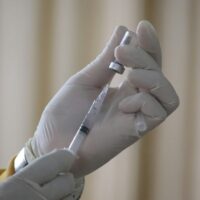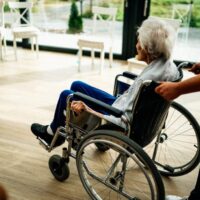On the day when the national COVID-19 death toll passed 100,000, Gov. Andy Beshear announced that with the addition of six new deaths, Kentucky’s toll from the pandemic has hit 400.

“Let’s all acknowledge that losing 400 people to anything, at any time, for any reason, isn’t OK,” Beshear said Wednesday at his daily briefing. “Let’s just remember that we’ve lost 400 Kentuckians, and this thing isn’t over yet.”
The governor and Health Commissioner Dr. Steven Stack spent much of their briefing saying why masks are needed, and addressing the politics of that.
“Masks have somehow become this division among people,” Beshear said. “Yes, they’re not comfortable; and yes, they can be hard to breathe from; and yes, they keep people from seeing your beautiful face; but they protect people.”
As Stack urged all Kentuckians to wear a mask, he also encouraged those with divergent views to be respectful of each other, asking those who choose to not wear a mask to not ridicule those who do, and asking those who do wear one to protect themselves by giving a wide berth to those who don’t.
“I want to you to be patient and kind and tolerant of each other so that we don’t have something like this — which is a simple public-health step to try to keep people safe — turn into strife and conflict among ourselves,” he said.
Stack stressed that there is no disagreement among public-health professionals about the importance of wearing a mask to slow the spread of the disease, since we know that the virus is spread by the spit and saliva from our mouths when we talk, cough, sneeze and sing — and that many have the virus, but no symptoms.
He said some Kentuckians may not understand how bad the pandemic could have been in Kentucky if he and Beshear had not taken all the measures they did to slow its spread.
“I think we forget because we didn’t have the same magnitude of crisis we might have had, because we didn’t live in Kentucky what they lived through in New York City,” Stack said. “We didn’t see the horrors at the scale that they had to see in other places and I think that that’s made this feel too distant and too removed from our present reality.”
Beshear cautioned that as the economy reopens, it’s even more important to keep our hands washed and wear a mask, reminding Kentuckians that the novel coronavirus is easily carried into long-term-care facilities, where most of Kentucky’s covid-19 deaths have occurred.
“Remember, it gets into these facilities somehow. It’s not just starting there,” he said. “It’s passed between people outside these facilities and brought in there.”
Testing issues
He also called for more people — especially in Western Kentucky, where infection rates are highest — to take advantage of the free Kroger-sponsored testing sites. He noted that there are still hundreds of empty slots available in Bowling Green and Henderson.
The day before, Beshear called on local officials in the region to encourage their constituents to get tested, revealing that some had rejected testing sites while those in Bowling Green had set a good example.
“None of this, ‘We don’t want testing, so we don’t know there’s a problem’,” he said. “Our Warren County leaders haven’t done that, though we’ve had some others that have declined testing sites. That is turning your back on your people. We’ve got to know the level of our problem if we are going to protect the people that are out there. That means we have testing everywhere so we make sure we keep people safe.”
Beshear said officials in Shelby County, which recently had a 50% increase in cases among Hispanics,”turned down a Walmart testing facility. We thought that that was interesting, but ultimately the health department and the county judge have to make decisions on that.”
Citing federal and state health officials, Beshear said, “The only way that we can reopen our economy safely is if we have significant testing, and that requires you the people of Kentucky to be willing to get tested and get tested regularly.”
Asked how often a person should be tested, he said that while the Centers for Disease Control and Prevention has not issued guidelines on that yet, he advised anyone regularly in the workforce to get tested about once a month if they are not showing symptoms, and immediately if they are.
The free drive-thru Kroger testing next week will be Louisville, Lexington, Elizabethtown and Bowling Green; sign-ups are now open. So far, at least 200,762 tests have been done in Kentucky.
Lt. Gov. Jacqueline Coleman said the Team Kentucky Fund, which is available to Kentuckians who have lost employment or have had their hours or wages cut by half or more because of the pandemic, has received more than 1,900 applications for assistance.
The $3.2 million fund is available to all Kentuckians, but Coleman especially urged people in Breathitt, Fleming, Harlan, Knott, Knox, Lee, Leslie, Letcher, Mason and Wolfe counties to apply because they had received few applications from those counties. Click here to apply.






